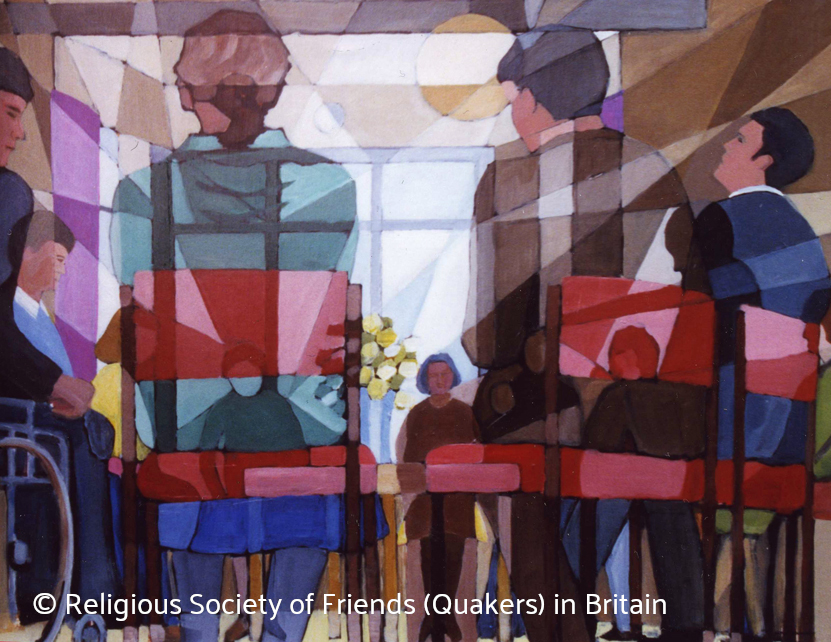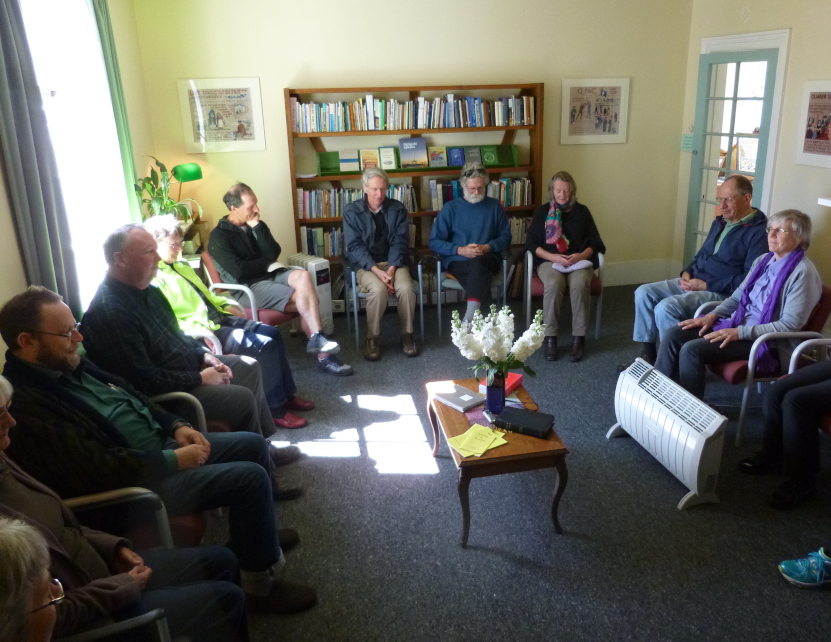Quakers in Whakatu Nelson
• Meeting for Worship
• Spiritual Nurture
• Home Discussion Groups
• Business Meeting
• Children & Young People
• Social Concerns
• Our Beginnings
• Site of NZ's First Society of Friends Meeting House
Meeting for Worship
“Meeting for Worship is a form of communion for Friends in which we gather in silence, listening for guidance. Worship is not something we do but is a state of consciousness we enter which brings us into communion with Spirit. Meeting for Worship is at the heart of Quaker faith and practice.” fgcquaker.org
The Whakatu Nelson Meeting gathers for Meetings for Worship every Sunday at 10am. We meet at 30 Nile Street, Whakatu Nelson. Friends in Motueka meet on the second Sunday of the month at 10am at the Family Service Centre. Meeting lasts an hour and is followed by Reflections (when you can speak about insights or revelations received during Meeting that didn’t make it to ‘ministry’, rather than a time for discussion.) ‘Ministry’ is a message spoken by someone who is prompted to break the silence of Meeting).
We share notices of Quaker activities and other actions we support in our city and region, before a time of community over morning tea. All are welcome to try out Meeting for Worship without any commitment. If you decide to make Meeting your spiritual home we offer a safe, loving community.. We aim to help one another live better lives.
Home Discussion Groups
On the 3rd Wednesday of every month we meet in the home of the hosting Friend to discuss the topic of their choice. Topics have included Humility, Forgiveness, Living peacefully, how Quakers have fun, Think it possible you may be mistaken, Empowerment. The topic and venue are announced at Meeting for Worship and in our monthly newsletter.
Business Meeting
Every two months we in Whakatu Nelson hold a Business meeting to make decisions on such things as the maintenance of the Meetinghouse, national Quaker concerns, and to plan our activity. Its ‘proper’ name is Meeting for Worship for business – we seek spiritual guidance in the same way as we do in any Meeting for Worship. The meeting opens and closes with silence and each Friend’s contribution is heard with a short silence to consider its relevance. The intention is to discover the will of God, however that is conceived by each Friend. We call the person who facilitates these meetings a ‘clerk’. They put words to the process, drafting a ‘minute’ (a succinct statement summing up the emerging sense of direction) and seeking the meeting's confirmation that it accurately reflects the direction in which Friends are being led. Decisions are made not by voting nor really by consensus but by the meeting developing its understanding, until unity is reached. It may be that not everyone agrees, but they will accept it as the way forward. It takes patience and discipline to conduct Business Meetings in this way but the decisions made are strong.
Children & Young People
Children are valued by Quakers and our testimony of equality applies to them too. Children call the adults of the Meeting by their first name and regard them as Friends, whatever their age. Children are welcome at Meeting for Worship. Even quite young children can cope with a short period of silence, especially when they see the adults and other children around them sitting quietly. Children may speak in Meeting for Worship if they feel they have something to say, and this is respected as is any other contribution.
Most Meetings, Whakatu Nelson Meeting included, will have children join the Meeting for Worship for about 15 minutes, either at the beginning or at the end of the hour. For the rest of the time they have an opportunity to do art or craft work, to learn about Quaker history and values, get to know the other children and the adult helpers and enjoy a sense of belonging to the Quaker community.
Young Friends (YFs) are those over 16 who consider themselves 'young' (some may be in their 40s). There is an annual Young Friends camp and an online Meeting for Worship that links YFs around the country.
Junior Young Friends are aged 13 to 16. They also have an annual camp with YF and adult leaders and in larger meetings will have their own group on a Sunday. Camps are a great opportunity to learn from older Friends and to have a sense of identity among Quakers.
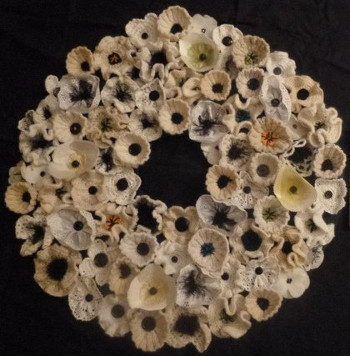
White Poppy Wreath created by Nelson and Golden Bay Quakers in 2015 to commemorate all non-combatants who lost their lives in WW1
Social Concerns
• Peace
• Child Poverty
• Housing
• The Living Wage
• Support for Palestine
• Natural Funerals
• Children, teens and gender
Friends in Whakatu Nelson Meeting are active in:

Peace: Whakatu Nelson City has a long history of peace activism. The Peace Grove opened in 2016 records Quaker contributions to peace in Whakatu Nelson. We hold peace vigils on Anzac Day,, and to commemorate Hiroshima and Nagasaki Days. A Friend created a Peace Exhibition in 2015 to counterbalance the WW1 military celebrations, that was viewed by more than 100 visitors, and a White Poppy Wreath remembering all non-combatants killed during WW1 was displayed in the Christ Church Cathedral. It won international recognition when in 2017 it was chosen to appear in Friends World Committee for Consultation 2018 calendar. In 2021 we were among the founders of a new group, Peace Action Network Whakatu, which hosted public movie showings of Soldiers without Guns and Rainbow Worriers of Waiheke Island. Each year we support Parihaka Day, November 5th, celebrating Peace in Whakatu, creating exhibitions in the Whakatu Nelson and Waimea Richmond Libraries relaying the history of Parihaka Day 1881, the reconciliation with the Crown in 2017, and the Crown apology to the people of Parihaka past and present. After a Dawn Blessing of the City on November the 5th we host breakfast for those attending the ceremony. We support the Parihaka Network Peace Connection Whakatu in organising these events. You can read about that on our Facebook timeline, Quakers in Nelson., @nelsonquakers.
Child Poverty: We know that in the midst of Whakatu Nelson’s beauty and bounty are those whose lives are marred by poverty. Our Meeting makes regular donations to Auckland Point School and its Young Parents School.
Living Wage Campaign: Our Meeting is a member of the Living Wage Campaign, which brings together community/secular, union and faith-based groups around a common goal of achieving a living wage that will enable workers to live with dignity. We ensure anyone who provides services to us is paid at least the Living Wage of $26/hr .
Support for Palestine: Our Meeting is allied with Te Tau Ihu Palestine Solidarity, participating in events organised to educate people about the apartheid suffered by Palestinians and to rally support for the Boycott, Divest, Sanction movement. Quakers in Whakatu Nelson resolved to boycott Israeli products as part of our support to the people of Palestine. We frequently post educational material on the plight of Palestinians on our Facebook page Quakers in Nelson @nelsonquakers. We are a member of the Interfaith Network of Californian-based campaigning organisation Jewish Voice for Peace, calling for international action to isolate Israel for its illegal occupation of Palestine and oppression of the Palestinian people.

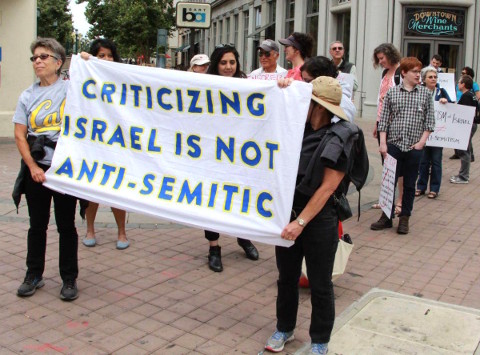
Natural Funerals: Friends are involved in the Natural Funeral movement, which is consistent with Quaker Simplicity. Our Meeting has facilitated the Natural burial of Friends of our Meeting, and offers support for natural burial or simple cremation for any Friend who has recorded a request for such assistance.
Concern regarding children, teens and gender:
This statement is not a statement agreed by the national organisation of Quakers in Aotearoa. It is a statement which has been approved by Nelson Recognised Meeting. A national statement was agreed by Quakers in May 2023, you can find that statement here: quakers.nz/sites/default/files/documents/Walking_in_the_light_under_the_rainbow.pdf. The 2024 Quaker Lecture, "A Queer Gift - Stepping beyond the mindset" can be found here: quakers.nz/deepen-ako-atu-ano-/quaker-lectures.
In December 2022 Nelson Meeting recorded the following Minute:
Nelson Recognised Meeting records our concern, because the numbers of detransitioners are increasing internationally, for the wellbeing of children and young people who may at school and through friendships and social media come to believe that they have an identity different from their sex. Our concern is that through social pressure and internet misinformation and in the absence of long term, evidence-based research, some children who are affirmed as their chosen gender and some of whom may have autism, ADHD, trauma, OCD or other mental health problems, are much more likely to undergo irreversible medical and surgical treatments, that they may later regret.
We record our respect for those whose early and enduring gender dysphoria leads them in their mature adulthood to choose to transition to the opposite sex.
We record our concern that any discussion on important but controversial matters should be conducted in the Quaker tradition of respectful listening.
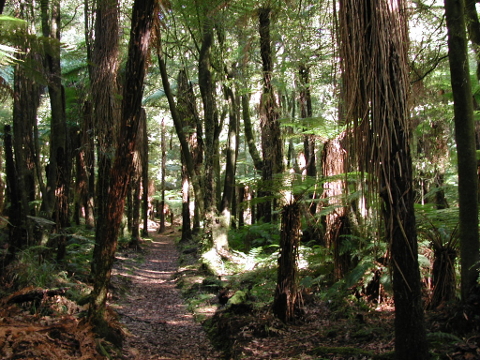
Quaker Quest:
The Quaker Quest series of discussions had been held at our Meeting House at about 18 month intervals since 2007, until Covid 19 prevented us. Discussions introduce how the Quaker speakers think about their topics, such as Christianity, the Bible, Meeting for Worship, Sex, family and relationships, Peace-making, Death and Dying, Sustainability, and Refugees. Attendees can share their own perspectives, and be part of a brief Meeting for Worship. To be notified of the dates and topics register an interest with info@quakers-in-nelson.org.nz .
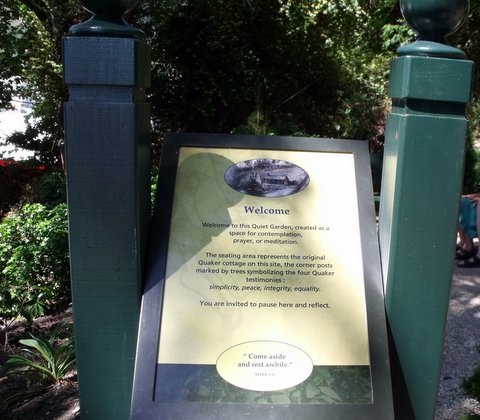
Quiet Garden on Quaker Acre, Rutherford St., Nelson
Our Beginnings
Three Quakers arrived in Whakatu Nelson in 1842 as part of the New Zealand Company's settlement under Arthur Wakefield: Frederick Tuckett, Samuel Stephens and John Sylvanus Cotterell. All were surveyors with a keen interest in the new colony and in forming positive relationships with Maori. A farming family, Martha and Samuel Strong and their children, were also Quakers as was Isaac Mason Hill.
Sylvanus Cotterell was allotted an acre of land at 136 Rutherford St and an etching shows a cottage with a picket fence surrounded by farmland. Today that place is five minutes' walk from the centre of the city.
In 1843, while surveying in the Wairau area, conflict with Maori over land which had not been sold led to Cotterell's death along with 21 others, including Arthur Wakefield. Aged just 24, Cotterell was unarmed and is thought to have attempted to make peace in the confrontation. His last letter home spoke of his pleasure at having learned enough of the Maori language to be able to discuss spiritual matters with Maori friends. He is buried with the other English casualties of the incident at Tuamarina.
For a decade Cotterell's cottage stood empty. In 1853 Robert Lindsay from Brighouse Meeting in Yorkshire travelled to New Zealand to support local Quakers. Whakatu Nelson Friends had been meeting in the home of Samuel Strong and his wife Martha. In consultation with the Strongs and Isaac Mason Hill, Lindsay bought Cotterell's cottage. With some modifications to the house and grounds it became the first Quaker Meeting House in New Zealand and a Meeting for Worship was held there on 15 May 1853. Six adults and three children were present.
The meeting appears not to have continued for very many years. Martha Strong died in 1854 and is buried in a small fenced graveyard on the site, along with Samuel who died in 1875 and two of their infant children. Frederick Tuckett returned to England. Isaac Mason Hill lived a long life as a respected member of the community with an interest in Maori welfare and education. He died in 1885 and is buried in the Baptist section of Wakapuaka cemetery. There is little known about Quakers in Whakatu Nelson from those early times until the early 20th century.
Eventually the acre of land was sold, on the understanding that the graveyard would be maintained by Nelson City Council. In 2010, with funding and support from the community, Whakatu Nelson Friends established a Quiet Garden on the site of the Meeting House.
In the 1920s and 30s a small meeting gathered in each other's homes. Theodore and Esther Rigg and their family were part of this meeting, having come to Whakatu Nelson after their relief work during the First World War came to an end.
In the 1960s the present Meeting House, formerly the home of John and Enid Hazelwood, was left to Friends in Enid's will. It has been the Meeting House since then and is often noticed by visitors because it is in the central city, close to the Cathedral. Unusually, in Whakatu Nelson Friends are called to worship by the Church bells!
Quaker History in Nelson Town Acre 667 – Site of New Zealand’s first Society of Friends Meeting House.
Martha and Samuel Strong are buried here, in the top corner of what was once Town Acre 667. Members of the Society of Friends (Quakers), they both attended worship in New Zealand’s first Quaker Meeting House on this site, 15 May 1853. Martha was unwell at this time and the following year she died and was buried here. Samuel Strong is buried beside his wife. Two infant children of Isaac Hill are also buried here, one named Samuel Tertius, the other name unknown.
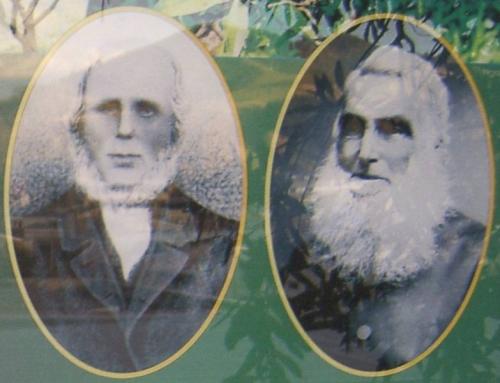
Samuel Strong(1795-1875) and Isaac Hill (1816-1885)
The Strongs arrived in New Zealand in the ship Bombay in December 1842. They were keen members of the Quaker faith and for a time held regular meetings in their own home. Other Nelson Quakers included surveyors Samuel Stephens, John Cotterell and Frederick Tuckett, and storekeeper Isaac Hill. It was Cotterell who selected Town Acre 667 in 1842 from the New Zealand Company, but died the next year. Two English Quakers, Robert Lindsay and Frederick Mackie, purchased the Acre from Cotterell’s heir and established the Meeting House in the small cottage that was on the site. The building was first used for Worship on 15 May 1853, when 6 adults and 3 children were present.
The drawing from which the photo below was made was probably done by Frederick Mackie who accompanied Robert Lindsay. It is thought that meetings were not held here on a regular basis after the death of Samuel Strong in 1875. The land was leased to timber merchant Henry Baigent in 1884 and was used as a horse paddock. In 1922, parliamentary authority was obtained to sell most of the Acre for subdivision, except 17.5 perches which included the graves and the site of the Meeting House. The Nelson City Council took over maintaining the property in 1934.
Members of the Society of Friends, although few, were valued in the early settlement period of Whakatu Nelson for their concern for the welfare of Maori people and abhorrence of the use of force against them. They supported the establishment of churches and schools of all denominations. Early Whakatu Nelson Quakers Tuckett and Cotterell were both involved in the 1843 Wairau Incident where they refused to fight or bear arms. Tuckett escaped, but Cotterell surrendered and died; his grave can be found at Tua Marina, and that of fellow Quaker and surveyor Samuel Stephens at Fairfield Park Cemetery. Isaac Hill is buried in the Baptist section of Wakapuaka Cemetery. Although few in number, Isaac Hill treasured the company of his fellow Quakers at the early meetings held in Nelson at the Strong’s home.
I must acknowledge sitting in silence though with only a few to be a great privilege, and so all will find it who are absent from large meetings.”
Isaac Hill's diary, 2 October 1843.
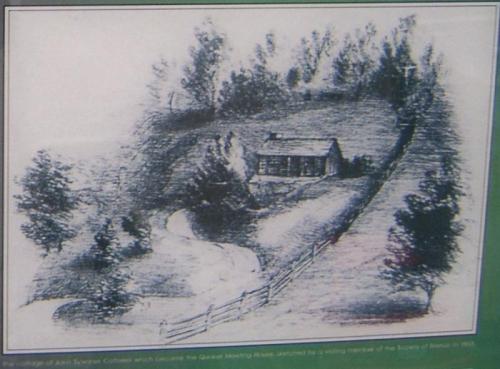
The cottage of John Cotterell, which became the Quaker Meeting House, purchased by Robert Lindsay of Brighouse (Yorks) for the Society of Friends in 1853
At the time the Meeting House was first established here, the Society applied to the government for funding under a “support for establishment of denominations grants”. The Society did not qualify due to its small number of members, but the government did provide prison labour to clear the property. It is recorded that native trees and shrubs were planted although none from this era survive today. Today an old yew, Taxus baccata, stands at the front of the grave. In England, yew trees have been a traditional tree for planting in churchyards and beside graves. The yew provided timber to make bows, crossbows and long bows.

